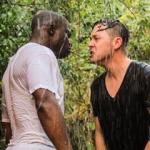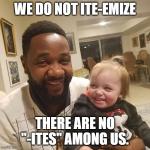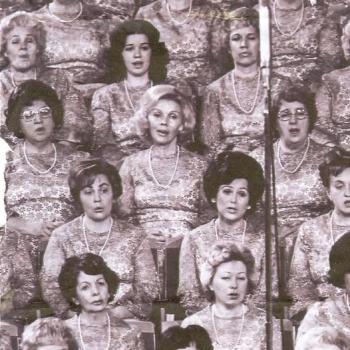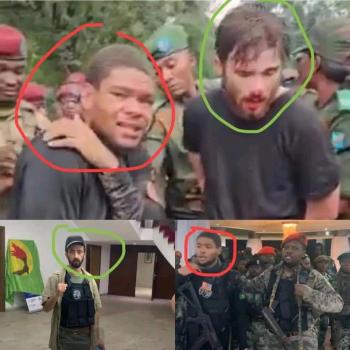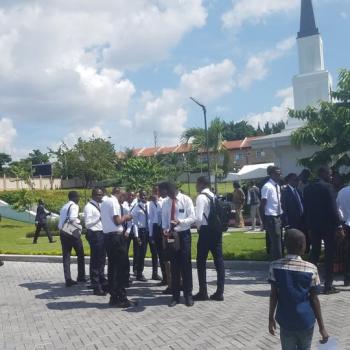The story of Joseph in Egypt has long been my favorite Bible story, but only recently did I become aware of modern people who imprisoned their siblings. One of these cases was in the DR-Congo, where I work with our organization. A brother, eager to claim property belonging to his sister, had her (Yvonne) jailed on trumped up charges. A jailer later confessed to Yvonne that he had been paid to kill her, but that he could not do it. While she was jailed, Yvonne was a fearless missionary. Another prisoner told her, “I wish I had met you earlier in my life. I will be executed tomorrow, so it is too late for me.” Her reply was, “But you will not be executed. You will be released.” And it happened exactly as she had said. Her common refrain was, “My God will justify me.” She was released after only a few weeks. The brother did succeed in stealing her home, and thereafter lived an epicurian life–until he dropped dead one day. Her response to his death was simply, “God will judge him, not I.”
In the apocryphal Book of Jasher, it is Simeon who sees Joseph approaching and says, “Behold, the man of dreams is coming to us this day. Let us kill him and cast him into one of the pits that are in the wilderness, and when his father shall seek him from us, we shall say an evil beast has devoured him” (V. 25). More details depict the rivalry between Simeon and Joseph, ending with Joseph being sold to Midianites and ultimately enslaved in Egypt. The King James Version does not mention Simeon’s particular involvement in the act, but refers only to “the brothers.” But the details from the Book of Jasher help us understand why Joseph–a powerful ruler in Egypt–chooses Simeon as his hostage to guarantee that his brothers (who don’t recognize him) return with the youngest, Benjamin. Simeon is kept in Egypt for at least fourteen months, and likely more.
When I work in the DR-Congo, I notice billboards everywhere with the word “Tribalisme” behind a big X. If the nation is to succeed, tribalism must end. It was ultimately tribalism which killed Patrice Lumumba, the man who wanted to unite all of Africa and to release the “Belgian Congo” from its European overlords. Though Belgium and the USA were intimately involved in the plans for Lumumba’s murder, the actual act was carried out by an enemy tribe of Lumumba’s tribe. Belgian officials provided the transport, but the bullets came from a Baluba firing squad. Modern tribalism perpetuates land disputes and wars. Images of the DRC tend to focus on violence and danger, though the vast majority of the country is peaceful and hopeful, though desperately poor. The poverty cannot be easily explained, but we know that a huge factor is the fact that tribal families shared wealth amongst themselves but not with others–especially if these tribal families had political power.
In the Church of Jesus Christ of Latter-day Saints, we believe that all of humanity existed as spiritual brothers and sisters before our mortal lives, and that we are to honor that brotherhood even when mortality introduces us to tribalism–familial, cultural, religious, political. The Book of Mormon is essentially the story of a family which breaks into tribes, feeding generations of tribes and sub-tribes with narratives seeking revenge for historical wrongs against them. The climactic chapter of the Book of Mormon is the appearance of the resurrected Savior to the descendants of these many tribes, who are charactized as “ites.” There are Nephites, Zoramites, Lamanites, etc. For a few hundred years after the savior’s appearance, the people live as a consecrated society, as described in 4th Nephi:
15 And it came to pass that there was no contention in the land, because of the love of God which did dwell in the hearts of the people.
17 There were no robbers, nor murderers, neither were there Lamanites, nor any manner of -ites; but they were in one, the children of Christ, and heirs to the kingdom of God.
In another part of the Book of Mormon, a community converted to Christ follows its king’s invitation to bury their weapons of war at a tune when an enemy attack seems imminent. In the Book of Alma 24, we read the king’s words:
16 And now, my brethren, if our brethren seek to destroy us, behold, we will hide away our swords, yea, even we will bury them deep in the earth, that they may be kept bright, as a testimony that we have never used them, at the last day; and if our brethren destroy us, behold, we shall go to our God and shall be saved.
Though LDS history includes some tragically violent episodes, the preceding verses from the Book of Mormon illuminate the peaceable ideals of the religion. Tribalism might be hard-wired into our mortal psyches, but reconciliation and unity are our godly, eternal goals–and pre-conditions of progress.
The story of Joseph and Simeon (with insights I have included from the Book of Jasher) gives us a template for reconciliation. Simeon is made accountable for his part in selling his brother into slavery, and is “enslaved” in Egypt just as Joseph had been. He experiences the same helplessness which Joseph had known at age seventeen. But Simeon will also experience forgiveness and reconciliation.
I have taken the story of Joseph and Simeon as our next film project in the Democratic Republic of the Congo and enlarged the reconciliation portion between Joseph and Simeon. In my re-telling of the story, I have Joseph (renamed Zaphnath-Paaneah by the Pharoah, according to the scriptures) disguise himself as a servant and meet privately with his jailed brother, Simeon–taking him food, making conversation, and gradually giving him greater and greater freedom. Towards the end of the film, the servant (Joseph) insists on learning more about how Simeon’s brother was “lost.” Twenty-two years have passed since Simeon and his brothers betrayed Joseph.
SIMEON
Our father heaped his grief on Leah’s sons and his favor on Rachel’s.
JOSEPH (SERVANT)
Go on.
SIMEON
He gave Joseph a coat worth more than anything the rest of us could afford.
JOSEPH (SERVANT)
A coat. Joseph. That’s who I saw in my dream.
SIMEON
Perhaps you sensed it from my thoughts. From the secrets I didn’t speak.
JOSEPH (SERVANT)
The coat was made of fine fabric.
SIMEON
I don’t know what fabric it was made of. There were many pieces sewn together. I handled it. Reds and yellows and blues and purples. It was as though the inheritance of
every one of Leah’s sons had been spent on Joseph.
JOSEPH (SERVANT)
No wonder you felt–
SIMEON
He came to us that day, wearing that coat–
JOSEPH (SERVANT)
That day?
SIMEON
The last day he was with us.
JOSEPH (SERVANT)
Before you lost him?
(Simeon waits.)
SIMEON
We didn’t lose him. We sold him.
JOSEPH (SERVANT)
You did what? Who are you, Simeon?
SIMEON
I am–.
JOSEPH (SERVANT)
Will you shout your name into the wind now? Should I seek cover?
SIMEON
(looking down, humbled)
I don’t think I can shout. And my name has become small. Who am I? I am Israel’s son. I am still a man of the covenant.
JOSEPH (SERVANT)
Then God will be with you. God–
SIMEON
–has punished me? Now that you know my past, that’s what you’re thinking. That’s what Reuben said before letting the guards bind me like a goat.
JOSEPH (SERVANT)
But Reuben participated in what you did, no?
SIMEON
He was off tending flocks. He imagined that he’d rescue Joseph after he did his chores.
JOSEPH (SERVANT)
Redeem him from the ones you sold him to?
SIMEON
Rescue him from the pit.
JOSEPH (SERVANT)
You said–
SIMEON
We cast him into a pit before we sold him.
JOSEPH (SERVANT)
All of your brothers did this? You were together in it?
SIMEON
Not all of them.
JOSEPH (SERVANT)
Who did this great sin?
(Simeon hedges in shame.)
SIMEON
I did it. It was I. I held Joseph’s hands.
JOSEPH (SERVANT)
Show me how. Finish the story.
(Joseph presents his hands to Simeon, who clutches them.
Simeon’s grip becomes harder and harder as the two of them
talk.)
SIMEON
I looked into his eyes–
JOSEPH (SERVANT)
Yes.
SIMEON
There was no mercy in my heart.
JOSEPH (SERVANT)
But he goaded you. He wore the coat to tempt you.
(Simeon releases his grip and shakes his head.)
SIMEON
For years, I tried to blame him. But he was not to blame. I hardened my heart from the moment of his birth.
JOSEPH (SERVANT)
What would you say to Joseph? You can say it to me.
SIMEON
Why would I–.
JOSEPH (SERVANT)
Perhaps God will hear you. Don’t shout it, though. Whisper.
SIMEON
(drawing close to Joseph and whispering into his ear)
My heart was hard, without compassion. Immovable. I was jealous. My father loved Joseph beyond all.
JOSEPH (SERVANT)
And he–
SIMEON
I set my mind against him. I did not see him as my brother. And our father–I did not spare our father.
JOSEPH (SERVANT)
Jacob.
SIMEON
Israel was his new name.
JOSEPH (SERVANT)
You did not spare Israel.
SIMEON
That night, he asked why I was sad.
JOSEPH (SERVANT)
What did you say?
SIMEON
I said, I am pained in my liver.
JOSEPH (SERVANT)
He asked no more questions?
SIMEON
He caught me weeping the next day. He thought I was sad because Joseph was–lost. He didn’t know. I mourned more than all of my brothers.
JOSEPH (SERVANT)
More? Why?
SIMEON
Because I killed my own brother!
JOSEPH (SERVANT)
You don’t know if he died.
SIMEON
How could he have survived?
(Joseph presents his hands again, and Simeon, caught up in his
emotion, clutches them.)JOSEPH (SERVANT)
Close your eyes and imagine that my hands are his.
(Simeon does so, but with resistance.)
JOSEPH (SERVANT)
God can do anything, isn’t that what you believe? If the wind can magnify your voice into thunder, then God can take your words back through time, back to that moment,
back to your brother.
SIMEON
God won’t unravel time.
JOSEPH (SERVANT)
Believe.
SIMEON
(breaking down)
Joseph, forgive me. Dear God, forgive me! I did not know how deep my jealousy was planted. I would do anything to have that moment back, to undo–oh, my God! Oh, my
brother!
He sobs and begins to collapse. Joseph embraces him.
JOSEPH (SERVANT)
I will speak for Joseph.
SIMEON
You never knew him.
JOSEPH (SERVANT)
Let us pretend.
SIMEON
He was a beautiful boy. The look in his eyes! Pleading!
JOSEPH (SERVANT)
Did you hesitate?
SIMEON
Yes.
JOSEPH (SERVANT)
I thought so.
SIMEON
I am impulsive. I never hesitate for long.
JOSEPH (SERVANT)
But you wish you had.
SIMEON
Dear God, yes!
JOSEPH (SERVANT)
Let me be your brother.
{Simeon gains control of his emotions and looks at Servant Joseph.}
JOSEPH (SERVANT)
Simeon, forgive me. I tried to blame you without accepting my own complicity.
(As Joseph -servant- talks, the two kneel to each other.)
Father sent me to you in the field. He didn’t see me put on the coat. There were other coats I could’ve worn. I chose that one to remind you of how much he loved me.
SIMEON
Joseph.
JOSEPH (SERVANT)
You tried to please your father. You strained for his approval. I pleased him as easily as flowing water. I taunted you.
SIMEON
How do you know these things?
JOSEPH (SERVANT)
I am a man of dreams.
SIMEON
You are like him.
JOSEPH (SERVANT)
Can you forgive me?
SIMEON
For dreaming?
JOSEPH (SERVANT)
For everything I just said.
SIMEON
In a game?
JOSEPH (SERVANT)
Tell me you forgive me
SIMEON
I don’t want to play like this. It’s mockery.
JOSEPH (SERVANT)
Close your eyes and speak to the heavens. Say “I forgive you.”
(As Joseph speaks these next words, he is forgiving Simeon.)
JOSEPH (SERVANT)
I forgive you.
SIMEON
I forgive you.
JOSEPH (SERVANT)
Let the words go to God and to our
brothers. I must prepare for the
guests.
The word Reconciliation in any translation (including a silent one) is perhaps the most important in all gospel vocabulary. It is, as my father Robert Blair said, “a gift we can and must give to others. Ultimately it is a gift we can receive from our Father in Heaven, even being reconciled with him through the Atonement of Jesus Christ.”
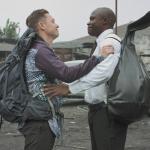
We are already in development of “Joseph and Simeon” and will be in pre-production in October, with filming beginning in January 2023 in Mbuji Mayi, DR-Congo. We will use one of the Congo’s regional languages (Tshiluba) as the family language and French (the colonial language) rather than Egyptian. We will honor the actual story in having Joseph use an interpreter until the climactic moment when he reveals himself to his brothers.
Any questions may be directed here .


